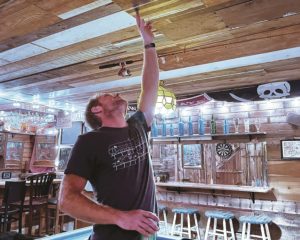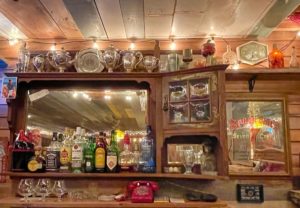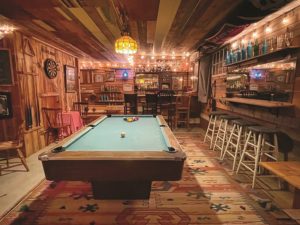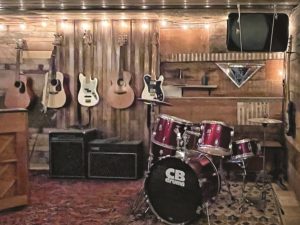The musician and carpenter Alex Brewer has deep family roots in Wellfleet. His great-great-grandmother was Ada Freeman, daughter of Capt. Richard Rich Freeman, the first president of Wellfleet’s Mercantile Wharf.

Raised just outside New York City, Brewer spent summers in his grandfather’s home off Chequessett Neck Road. “I kept staying longer and longer,” Brewer says. “Eventually, in 2017, I thought, why am I leaving?”
When he began working on homes here as a carpenter on a local crew, Brewer became fascinated with salvaging old wood. “We were taking pieces off jobs that I just couldn’t bear seeing thrown out,” he says. “I started saving wood before I even knew exactly what I was going to do with it.”
Using old boards for a floor is particularly rewarding, Brewer says. That’s because “there’s this contradiction — a floor is not usually an object of art. It’s not supposed to be whimsical or inspiring, but the fact that it just has to lay flat, that it doesn’t need structural integrity, gives you artistic freedom that you don’t find in other aspects of house carpentry.”
Brewer has artfully applied salvaged wood to the walls and ceiling in his grandfather’s basement to create what he calls his Dunegrass Tavern.

Reclaiming old wood is time-consuming. Each nail must be pulled individually. Piecing boards of different lengths, widths, and ages together is, Brewer says, like putting together a jigsaw puzzle: “When I’m doing this, I’ve got wood all over the floor, trying to figure out what might work in a particular spot. It’s one board at a time.”
Brewer remembers where practically every board comes from. “Old wood has so much personality,” he says. “Each piece has a story.” He points at a piece he salvaged during the renovation of a house from the 1800s on Old County Road in Truro. A cedar board comes from a house on Buttry Lane by Long Pond in Wellfleet.
The tavern’s design started with the bar. A reclaimed bathroom cabinet with a mirror from a teardown in Truro holds bottles of liquor. A carpenter friend gave Brewer a large piece of wood with a live edge for the bar. He covered the basement’s walls during the winter of 2019 and finished the ceiling in a work lull during the pandemic.

As Brewer’s friends and work colleagues learned about the tavern project, they brought him found items. A wall of shelves displays antique bottles found piled in an outhouse on a job site. “I should probably wash them,” Brewer laughs. But it’s the original look he is going for.
“When I find an item nobody else is going to want, that makes it even more appealing to me, because it’s got this castaway, lost vibe to it,” he says.
A big part of the fun is figuring out what fits where. The wall next to the antique bottles is covered in masks. “I thought, that’s so Wellfleet,” he says, “so retired Columbia University psychology professor.” A Brown University flag from his grandfather’s college days hangs next to an old Wellfleet license plate.
There is a pool table. It stretches lengthwise in front of the bar. Small tables with checkered red tablecloths and a chalk board with a menu — things Brewer serves when his musician friends come over to jam — make the place feel like a true tavern.

Along the far wall, Brewer built a stage. Here’s where he practices his guitar, plays house concerts, and dreams of hosting intimate theater productions.
People have asked if he might build something like this for them, Brewer says. It would be for a special kind of client, he figures. The collecting part is so personal. And it’s a project that requires some time — not so much for the carpentry work, but for gathering the unwanted wood and artifacts.
Yet time is exactly what makes the Dunegrass Tavern so magical. “Most everything these days is single-serving and disposable,” says Brewer. “I can’t save the world, but I can save some pieces of wood.”



